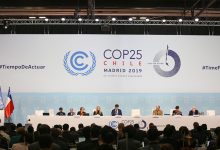The UK Government and the United Nations climate body, the UNFCCC, have announced that the next round of UN climate talks, COP26, that was due to be held in Glasgow in November have been delayed to allow governments to focus efforts on the immediate response to Covid-19.
While environmental groups have generally recognised the genuine need for the delay, they stressed that governments, including Australia’s, must not use it as an opportunity to evade meaningful action on climate change.
The UNFCCC Secretariat has advised that the current timeframe for the talks is no longer feasible, particularly with world governments focused on the immediate response to the Covid-19 pandemic, and they will work with countries to identify a new date.
Complicating the scheduling of the talks is the inability for negotiators to meet in the lead-up to COP26. Often these “intersessional” meetings held at the UNFCCC headquarters in Bonn throughout the year address much of the finer details, leaving bigger political decisions to the COP itself.
In making the decision to delay the talks, organisers recognised that it was virtually impossible to host a round of climate change talks that could lead to ambitious commitments from governments.
“COVID-19 is the most urgent threat facing humanity today, but we cannot forget that climate change is the biggest threat facing humanity over the long term,” UN climate change executive secretary Patricia Espinosa said.
“Soon, economies will restart. This is a chance for nations to recover better, to include the most vulnerable in those plans, and a chance to shape the 21st century economy in ways that are clean, green, healthy, just, safe and more resilient.”
“In the meantime, we continue to support and to urge nations to significantly boost climate ambition in line with the Paris Agreement,” Espinosa added.
The UK government is to act as the host of the talks in collaboration with the Italian government, and the two countries will work together to deliver a conference sometime in 2021, providing time for countries to focus on their Covid-19 response.
“The world is currently facing an unprecedented global challenge and countries are rightly focusing their efforts on saving lives and fighting COVID-19. That is why we have decided to reschedule COP26,” COP26 president and UK energy secretary Alok Sharma said.
“We will continue working tirelessly with our partners to deliver the ambition needed to tackle the climate crisis and I look forward to agreeing a new date for the conference,” Sharma added.
The delay was broadly welcomed by organisations involved in the climate change negotiations but warned that the delay cannot not be used as an excuse for delaying action on climate change.
“This pause is understandable in light of efforts to stop the pandemic we all now face. But this should not mean pausing our vital efforts to respond to a climate crisis that is already threatening lives and pushing millions of people deeper into hunger and poverty,” Oxfam Australia’s climate justice advocacy manager Conor Costello said.
The Australia Institute highlighted the fact that much of Australia’s plans under the Paris Agreement remain up in the air, including the contentious use of surplus Kyoto Units.
“The climate crisis will continue to escalate. This delay should not be used to postpone local climate action, or act as a free-pass for the Australian Government to neglect its climate obligations,” The Australia Institute’s Richie Merzian said.
“The Australian Government must proceed with and release its long term climate strategy, which is more important than ever as Australia looks to rebuild from the black summer fires and recover from the current pandemic.”
The Morrison government burnt through a significant amount of diplomatic capital that the most recent round of talks held in Madrid in late 2019, has clashed with other countries over plans to use surplus Kyoto era units.
The plan was described as not being “within the spirit of the Paris Agreement”, as a bloc of more than 100 countries pushed back on the plan that would have severely undermined the environmental integrity of the agreement.
“Australia may have escaped the grilling international spotlight this year, but the use of these Kyoto carryover credits remains illegal, disingenuous and globally unpopular, and will continue to undermine Australia’s climate and broader diplomatic efforts,” Merzian added.
The next round of talks is set to be a crucial moment in international action on climate change, as countries transition as the Paris Agreement comes into force for the first time.
Countries are expected to communicate updates on their planned course of action to tackle climate change, including a ramping-up of their 2030 emission reduction targets.
The Morrison government has flagged that it has no intention of increasing its 2030 emissions reduction target beyond the 26 to 28 per cent reduction to which it has already committed.
Instead, the Morrison government is set to present a “technology investment target”, which may include investments in carbon capture and storage and hydrogen from gas and coal, in addition to further investment in zero-emissions energy sources.
It will also be the first talks held following the withdrawal of the United States from the Paris Agreement, as instigated by President Donald Trump.
RenewEconomy and its sister sites One Step Off The Grid and The Driven will continue to publish throughout the Covid-19 crisis, posting good news about technology and project development, and holding government, regulators and business to account. But as the conference market evaporates, and some advertisers pull in their budgets, readers can help by making a voluntary donation here to help ensure we can continue to offer the service free of charge and to as wide an audience as possible. Thankyou for your support.










